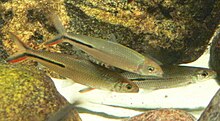The Hemiodontidae are a small family of freshwater characins found in northern South America, south to the Paraná-Paraguay Basin. The larger species are popular food fish.[1]
| Hemiodontidae | |
|---|---|

| |
| Hemiodus gracilis | |
| Scientific classification | |
| Domain: | Eukaryota |
| Kingdom: | Animalia |
| Phylum: | Chordata |
| Class: | Actinopterygii |
| Order: | Characiformes |
| Suborder: | Characoidei |
| Family: | Hemiodontidae |
| Genera | |
|
See the text | |
Hemiodontids have a streamlined body shape; many are fast-swimming, and are able to leap out of the water to escape predators. The adults of all species except Micromischodus sugillatus have no teeth on their lower jaws. Most species have a round spot on the side of the midbody and a stripe along the lower lobe of the caudal fin. The largest hemiodontids are around 50 cm (20 in) in length.[1]
Genera
editThe family has around 29 known species,[2] as well as several undescribed species, in five genera:
References
edit- ^ a b Weitzman, S.H.; Vari, R.P. (1998). Paxton, J.R.; Eschmeyer, W.N. (eds.). Encyclopedia of Fishes. San Diego: Academic Press. p. 104. ISBN 0-12-547665-5.
- ^ Froese, Rainer; Pauly, Daniel (eds.). "Family Hemiodontidae". FishBase. October 2011 version.
- Nelson, Joseph S. (2006). Fishes of the World. John Wiley & Sons, Inc. ISBN 0-471-25031-7